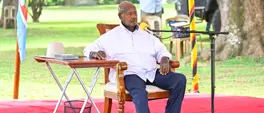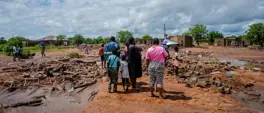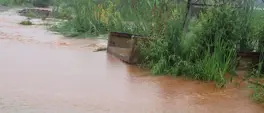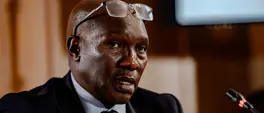After a decades-long struggle and a court order, Primrose Modisane finally has a birth certificate
Tania Broughton, GroundUp
5 August 2025 | 11:23Stateless since birth, she was called a 'border hopper' by Home Affairs officials.
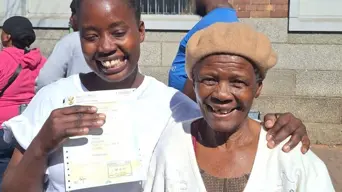
Primrose Modisane with her grandmother, Sentotorwane, after receiving her birth certificate. Picture: Supplied
Primrose Modisane, who has endured a life of statelessness and a decades-long battle with the Department of Home Affairs (DHA), has finally received her South African birth certificate.
Pretoria High Court Judge Mandla Mbongwe ruled in April that Home Affairs must issue Modisane, who was represented in court by Lawyers for Human Rights (LHR), with a birth certificate within 30 days.
But this did not happen. Only five months later, and after Modisane, LHR and retired Constitutional Court Judge Johann Kriegler scheduled a media briefing to publicly shame DHA on Tuesday, did the department finally comply with the court order.
Modisane will now be able to apply for a South African Identity Document, allowing her to vote, access grants, and enrol her children in school.
GroundUp previously reported on the plight of Modisane, who was born in Zimbabwe but is entitled to South African citizenship through her grandmother, who is still alive.
Tuesday’s scheduled media briefing, which was to be held at Constitution Hill in Johannesburg, was cancelled on Monday afternoon after Modisane was notified that her South African birth certificate was ready for collection.
Modisane received her birth certificate on Tuesday at the Germiston Department of Home Affairs with her granny and supporters by her side.
“The first thing I am going to do when I get my ID is open my own bank account, get my name added to my children’s birth certificates, and register my youngest child for school. Then I will go to my mother’s grave and tell her that this suffering is over,” she said.
Modisane’s mother, Phumulani Tshuma, received her own documentation only weeks before she died of untreated cancer in 2023. She had for years been denied hospital access because she was undocumented.
RETIRED JUDGE INTERVENES
In a statement, Justice Kriegler said: “This should never have taken this long. It should not take a court order, and a threat of a media briefing for a South African citizen to be acknowledged in her own country.”
In an interview with GroundUp, Kriegler said LHR had followed up with the department dozens of times after the court order but received no response.
He said he had approached the minister personally through an intermediary. “I have no doubt that the threat of public disclosure precipitated the sudden production of the birth certificate.”
He said Modisane’s claim to citizenship was confirmed because her grandmother still had her dompass.
“If a busy-body old judge hadn’t got angry, where would we have been? … I think there is a whole nation of stateless African people, who are born and live and die somewhere, coping and managing. Heaven knows how.”
HOSTILE ENCOUNTERS
In her court application, Modisane detailed her many “hostile encounters” with Home Affairs officials during her struggle to end her statelessness. She said she, her mother and her grandmother, who was 80 years old, were accused of being “border hoppers”, even though her grandmother was born in South Africa. They were passed from pillar to post. Even DNA tests, which proved their South African heritage connections, were ignored by the department.
Now a mother of two, Modisane discovered her “statelessness” just before her matric exams when the department visited her school to help learners get their ID documents in order to sit for exams. But she had no birth certificate and was denied help. She later learned that it was because her mother was unregistered and undocumented in South Africa.
Both Modisane and her mother were born in Zimbabwe (Modisane came to South Africa when she was five), but their South African lineage traces back on the maternal side to Modisane’s grandmother. This entitles them both to South African citizenship.
After her mother was finally granted citizenship, Home Affairs remained insistent that Modisane must produce her birth certificate from Zimbabwe. But her birth had never been registered there. Modisane said in court papers that she also could not travel to Zimbabwe to access birth records because she had no ID or passport from Zimbabwe or South Africa.
Modisane said she had hoped to study to become a social worker. But, after being denied an ID, she could not write her matric or study further. She became a domestic worker.
Without legal recognition in either Zimbabwe or South Africa, Modisane said she had been stateless for most of her life, unable to open a bank account or access social grants. She was left in a perpetual state of legal limbo.
Although she married a South African and had two children with him, her name was not reflected on the children’s birth certificates because she had no identity document.
It was only through DNA tests that the father’s paternity was established and her children were given birth certificates.
“I have suffered severe trauma, emotional harm and blatant infringement of my basic human rights caused by the unjust and inhumane treatment inflicted on my family and me by DHA officials. I was unable to complete my education. I have never voted. My mother never had the opportunity to vote because she died within months of receiving her ID,” Modisane said in her affidavit.
She said her mother had fought alongside her “up until her death”.
The Department of Home Affairs did not respond to a request for comment.
Get the whole picture 💡
Take a look at the topic timeline for all related articles.



